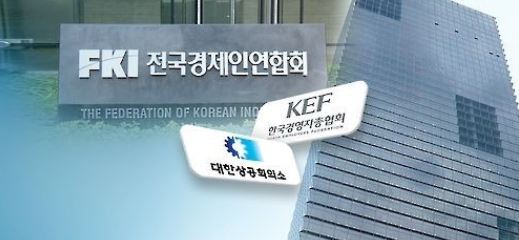South Korea's two major business lobby groups have come under criticism for not playing their roles in major corporate and labor issues, market sources said Monday.
The Federation of Korean Industries and the Korea Employers Federation haven't made their official stance toward the government's recent appointment of a former labor activist as chief of the Economic and Social Development Commission and an imminent court ruling on the matter of calculating regularly paid bonuses as part of standard pay.
They haven't issued any statements toward those issues even at the requests of local media companies.
The Federation of Korean Industries and the Korea Employers Federation haven't made their official stance toward the government's recent appointment of a former labor activist as chief of the Economic and Social Development Commission and an imminent court ruling on the matter of calculating regularly paid bonuses as part of standard pay.
They haven't issued any statements toward those issues even at the requests of local media companies.

"The two organizations should have released their analysis reports on the possible impact of the changes or statements on behalf of local companies to help minimize the fallouts from any rulings or changes that can affect how companies do business," an official at a local conglomerate, a FKI member, said over the phone.
Last week, the Moon Jae-in's government named Moon Seong-hyeon, who formerly led the now-dissolved Democratic Labor Party, to head the commission under the presidential office. A court ruling on the wage issue is scheduled for Thursday, with all eyes on the decision due to its grave impact on the country's industries.
As for the government's decision to raise the country's minimum wage by 16.4 percent to 7,530 won per hour for the year of 2018, the KEF issued only one statement related to the decision.
Even if the status of the FKI and the KEF has been sharply reduced under the Moon administration, business people want the organizations to do their job of representing and protecting their interests.
In March, the FKI, once the country's most influential business lobby, announced its "drastic" reform plan to transform itself into a transparent, consensus-seeking and research-focused entity. The plan also included a 40 percent reduction in its budget and workforce.
The FKI came under fire as chief executives of member conglomerates, such as Samsung, Lotte and SK Group, were accused of being involved in the massive corruption scandal that ultimately removed former President Park Geun-hye from office in March and last week put Samsung Group's heir apparent Lee Jae-yong behind bars for bribery and other charges.
After months of restructuring, the number of FKI workers has fallen to 110 from 215 and that of member companies has decreased to 400 from 600. Conglomerates, such as Samsung, Hyundai Motor, SK, LG, and POSCO, have withdrawn from the lobby group since March.
In May, President Moon said the KEF has played a pivotal role in widening the gap between the high-income and low-income earners by generating nonregular workers.
His remarks came after the KEF criticized the incumbent government's policy of generating jobs by injecting taxes as a "stop-gap remedy" and that labor unions' calls for more regular jobs are "hard to accept" given unfriendly business conditions. (Yonhap)





![[Herald Interview] 'Amid aging population, Korea to invite more young professionals from overseas'](http://res.heraldm.com/phpwas/restmb_idxmake.php?idx=644&simg=/content/image/2024/04/24/20240424050844_0.jpg&u=20240424200058)












![[KH Explains] Korean shipbuilding stocks rally: Real growth or bubble?](http://res.heraldm.com/phpwas/restmb_idxmake.php?idx=652&simg=/content/image/2024/04/25/20240425050656_0.jpg&u=)

